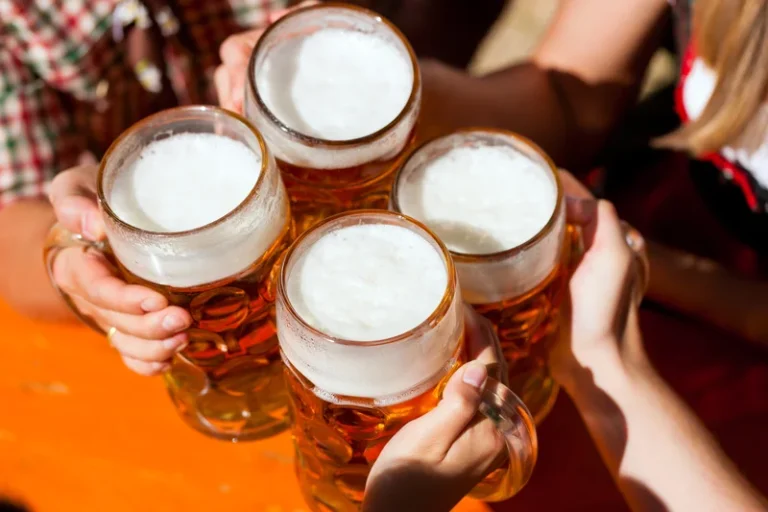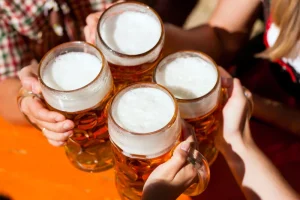
Drinking alcohol can reduce your liver’s ability to regulate the release of carbohydrates into your bloodstream. When this happens, your blood sugar can drop too low, which is known as hypoglycemia. On the other hand, if you have lots of food and then drink too much, your blood sugar can get too high. Alcohol stimulates your appetite and may affect your judgment, which may cause you to overeat and disrupt your blood sugar control.
- Food slows down the rate at which alcohol is absorbed into the bloodstream.
- Several findings concerning the involvement of chronic, heavy alcohol consumption in glucose metabolism is negatively correlated with that of insulin concentrations, in addition to the fasting insulin levels.
- Over time, the cumulative impact of oxidative stress can lead to insulin resistance, impaired glucose metabolism, and eventually, T2DM.
Health Categories to Explore
In the fasting state, as a first line of defense against hypoglycemia, glycogen is broken down into its constituent glucose molecules, which are secreted by the liver into the blood to maintain normal or near-normal blood sugar levels. Generally, the glycogen supply is depleted after 1 or 2 days of fasting. Thus, a person who has been drinking alcohol and not eating for 1 or more days has exhausted his or her glycogen supply. Two additional medications—metformin and troglitazone—are now being used to treat people with type 2 diabetes.
- What’s more, when the liver breaks down alcohol, it converts it to fat, which can contribute to weight gain.
- Clinical experience indicates, however, that a testosterone deficit rarely is the sole reason for impotence in diabetic men, because treatment with testosterone rarely restores potency in those men.
- Accordingly, it promotes gluconeogenesis and the breakdown of glycogen into glucose.
- Doctors advise some people with diabetes to abstain from alcohol for reasons unrelated to their blood sugar.
- Alcohol inhibits your body’s ability to burn fat, boosting appetite and triggering cravings for a high-calorie diet.
Is there a safe alcohol consumption level for people with diabetes?
Adjusting diet and medications, engaging in therapy or participating in support groups may be recommended to address underlying issues driving excessive alcohol consumption. The combination of alcoholism and diabetes is problematic for anyone who continually monitors their blood glucose levels. Diabetic patients may benefit from alcohol’s favorable effects, including improved insulin sensitivity and cardiovascular protection.
Get the latest resources for Healthy Living

The details are kept up to date to help people with addiction treatment needs get the most full and precise facts about the rehabilitation facility. As an added complication, there is a substantial overlap between the feeling of tipsiness (or drunkenness) and the symptoms of hypoglycemia. Both conditions can make you feel woozy, wobbly, hungry, tired, or confused.

Abstinence from alcohol generally leads to normalization of the triglyceride levels, unless the person has an underlying genetic predisposition for hypertriglyceridemia. Alcohol abuse significantly increases the risk of developing Type 2 Diabetes through mechanisms such as insulin resistance, weight gain, and liver damage. Understanding the connection between excessive alcohol consumption and diabetes is essential for making informed lifestyle choices.
Alcohol and Carbohydrates

However, the organization recommends that females with diabetes limit their consumption to one drink per day and males limit diabetes and alcohol blackouts their consumption to two drinks per day. The ADA does not forbid a person with diabetes from consuming alcohol, but they do not advise it either. If someone with diabetes chooses to drink alcohol, the ADA recommends limiting consumption to a moderate intake. This translates to one drink per day for females and up to two per day for males.
Treatment
While genetics, unhealthy diets, and sedentary living are the obvious culprits, alcohol abuse is often overlooked as the primary cause. Overall, illicit drugs also increase the risk of severe mental health issues and other health complications. Yet, the effects are not as well documented as with alcohol and tobacco. Whether you live locally or seek addiction treatment in Boynton Beach FL, professional support can lead to long-term recovery and significantly reduce the chances of diabetes-related complications.
- Detailed analyses demonstrated that although the glucagon and epinephrine responses to hypoglycemia were unaffected, the growth hormone and cortisol responses were reduced after alcohol consumption.
- T1DM (insulin-dependent diabetes) results due to autoimmune progressive destruction of insulin-secreting β-cells of the pancreas by CD4+ and CD8+ T cells and macrophage infiltrating the islets 19.
- They can also help identify safer strategies for managing both diabetes and alcohol use.
- It occurs when the body either does not produce enough insulin (Type 1 Diabetes) or cannot effectively use the insulin it produces (Type 2 Diabetes).
You can save your life by drinking slowly
Oxidative stress is pivotal in the development of type 2 diabetes mellitus (T2DM) caused by alcohol misuse. Drinking alcohol elevates the liver’s Sober living home workload, releasing free radicals and reactive oxygen species that wreak havoc on cellular and tissue components. This onslaught extends to the pancreas, a critical organ for insulin production.

The Impact of Chronic Alcohol Consumption on the Pancreas
As you mull these ideas, keep in mind that much remains to be learned about how alcohol affects people with diabetes. Nevertheless, it would be wise for GLP-1 users to remain careful with alcohol. Drugs in the GLP-1 family, including semaglutide and tirzepatide, are known to provoke vomiting — just like excessive drinking. Insulin’s effect is always at least somewhat unpredictable, and you also have the delayed blood sugar-lowering effect of alcohol to worry about. The use of rapid insulin could make the morning-after hypoglycemia even more extreme.
A treatment center will attempt to verify your health insurance benefits and/or necessary authorizations on your behalf. We cannot guarantee payment or verification eligibility as conveyed by your health insurance provider will be accurate and complete. Payment of benefits are subject to all terms, conditions, limitations, and exclusions of the member’s contract at time of service. Your health insurance company will only pay for services that it determines to be “reasonable and necessary.” The treatment center will make every effort to have all services preauthorized by your health insurance company. Our writers and reviewers are experienced professionals in medicine, addiction treatment, and healthcare. AddictionResource fact-checks all the information before publishing and uses only credible and trusted sources when citing any medical data.